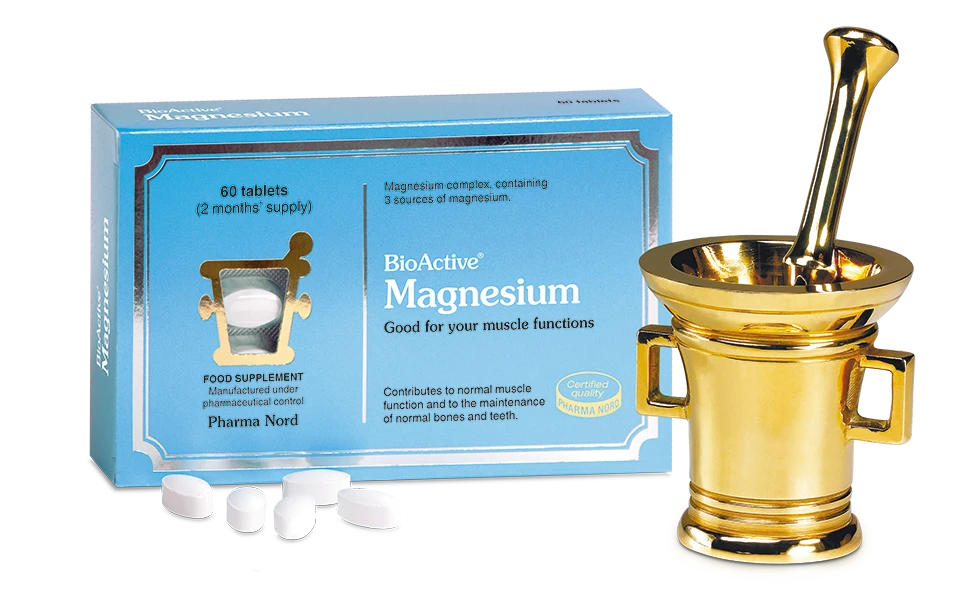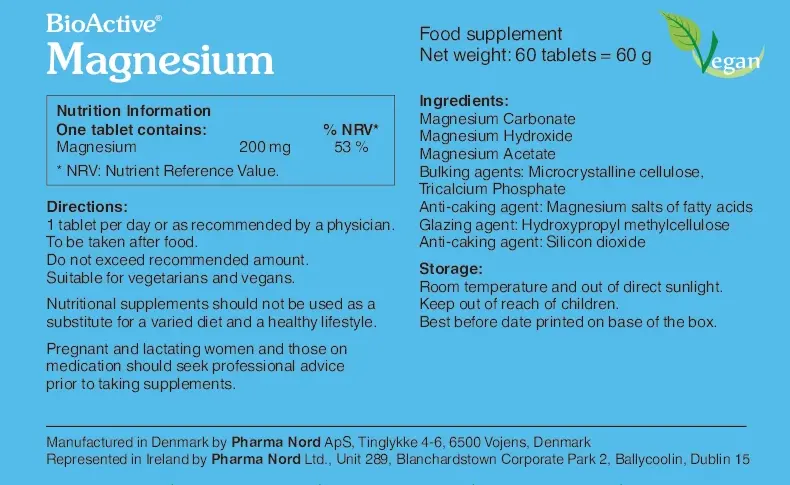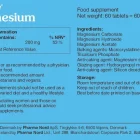Description
Contributes to normal muscle function, bones and teeth
- BioActive Magnesium contains a complex with three different magnesium salts in a matrix making it fast-soluble and easily absorbed
- Supports the maintenance of normal bone and teeth.
- Contributes to normal nerve function and normal muscle contractions
- Contributes to reduced fatique
- Manufactured under Danish pharmaceutical control
Bio-Magnesium is a complex of three different magnesium salts. Each tablet provides you with 200 mg of pure magnesium. The tablet contains a mixture of organically and inorganically bound magnesium contained in a matrix that causes the tablet to dissolve completely within a few minutes – even in people with a low stomach acid content – where the magnesium content will be changed to a absorbable ion form providing a high absorption. Bio-Magnesium tablets are normally swallowed whole, but can also be chewed or dissolved in a glass of water. Bio-Magnesium need not necessarily to be consumed with a meal.
What is Magnesium?
Magnesium is a essential mineral and a vital alkaline-forming element. Also, it is the fourth most abundant mineral in the human body which says something about its importance. Magnesium is present in all cells, with 98% of the mineral being inside the actual cell. An adult contains approximately 24 grams of magnesium. About 25% is found in muscle tissue and about 60% is in our bones together with other minerals like calcium and phosphorus.
Magnesium has several important roles in the body. It supports more than 300 different enzymatic processes. The following may help to elucidate magnesium’s importance. Magnesium contributes to:
- normal muscle function
- normal energy metabolism
- maintenance of normal bones and teeth
- normal psychological functions and electrolyte balance
- normal functioning of the nervous system
- a reduction of tiredness and fatique
- normal protein synthesis
- and has a role in the process of cell division
Increased focus on magnesium
Science has become increasingly interested in magnesium because of the mineral’s widespread influence on so many different body functions. At the same time, the need for extra magnesium is seen among coffee drinkers and elite athletes because excessive coffee consumption and heavy perspiration is known to deplete the body’s magnesium stores.
Good magnesium sources
Magnesium is found in different foods. Some of the good sources are:
- leafy greens
- almonds
- nuts
- seeds
- fruit
- kale
Magnesium deficiency
If the diet contains very little protein (less than 30 g per day) the body’s magnesium absorption is reduced. In a situation where the body has too little magnesium it will attempt to maintain a normal magnesium concentration in blood by releasing magnesium that is bound in bone tissue (just like it does with calcium). Because of this intricate mechanism, measuring blood levels of magnesium is not necessarily a useful way to determine if a person needs to increase his or her magnesium intake.
Overdosing
Our kidneys excrete magnesium in the urine if the body gets more magnesium than it needs. This reduces the risk of overdosing. When the body’s need for magnesium is saturated, further intake of magnesium will just lead to loose bowels, which also protects against overdosing. Magnesium intake in extremely high doses (10 times the normal dosage or more) may cause diarrhea, nausea and other types of discomfort.
Persons with renal impairment should not take supplements of magnesium unless it is recommended by a physician.
Directions:
1 tablet per day or as recommended by a physician. To be taken after food.
Do not exceed recommended amount.
Ingredients:
Magnesium Carbonate
Magnesium Hydroxide
Magnesium Acetate
Bulking Agent: Microcrystalline cellulose
Anti-caking agents: Tricalcium phosphate,
Magnesium salts of fatty acids
Glazing agent: Hydroxypropyl methylcellulose
Firming agent: Silicon dioxide










There are no reviews yet.